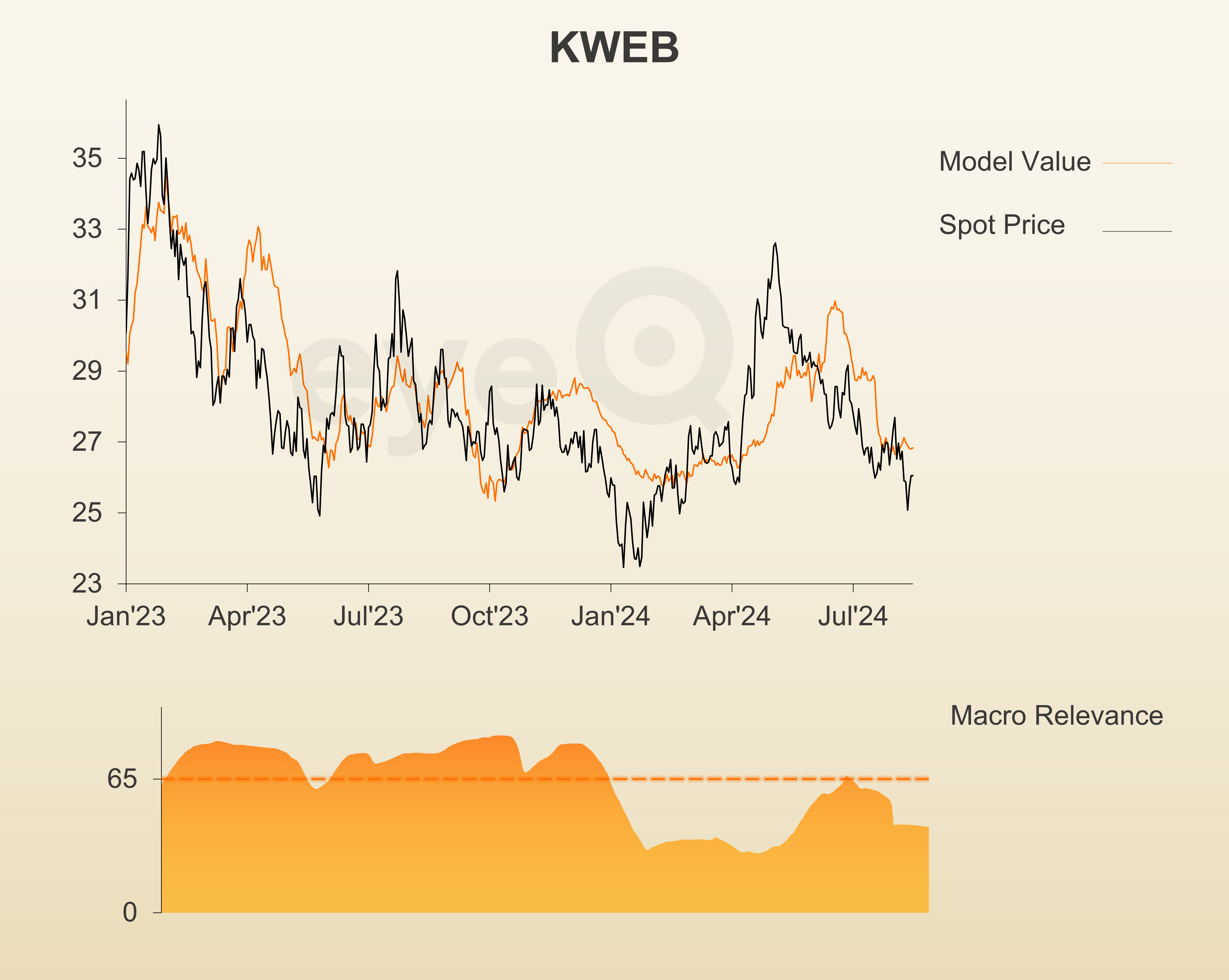eyeQ: a story that requires close monitoring
Experts at eyeQ have used AI and their own smart machine to analyse macro conditions and generate actionable trading signals. Here’s a tech fund for the watch list.
3rd September 2024 10:34
by Huw Roberts from eyeQ

"Our signals are crafted through macro-valuation, trend analysis, and meticulous back-testing. This combination ensures a comprehensive evaluation of an asset's value, market conditions, and historical performance." eyeQ
- Discover: eyeQ analysis explained | eyeQ: our smart machine in action | Glossary
KraneShares CSI China Internet
Trading signal: long-term strategic model
Fair Value Gap: -3.06% discount to model value
Model relevance: 42%
Data correct as at 3 September 2024. Please click glossary for explanation of terms.
ii analysis shows that Scottish Mortgage Ord (LSE:SMT) was the most-bought fund in clients’ ISAs last week. The 30% drop in Chinese e-commerce company PDD Holdings Inc ADR (NASDAQ:PDD) (owner of Temu and Pinduoduo) after poor earnings, was seemingly the catalyst – investors saw the dip as a good level to add.
This is interesting on two fronts. It suggests UK investors still believe in technology as a play. Scottish Mortgage is renowned for running high conviction, concentrated bets on tech stocks. “Invest in progress” is one of their slogans, and currently their two biggest holdings are chipmakers NVIDIA Corp (NASDAQ:NVDA) (6.8%) and ASML Holding NV (EURONEXT:ASML) (6.5%), i.e. artificial intelligence bets.
But it could also suggest that investors are relaxed about China - PDD Holdings and Meituan (SEHK:3690) are two of the top 10 holdings for the fund. Given the constant barrage of negative news about China right now, this could suggest retail investors are taking a long-term and somewhat contrarian view. Yes, the Chinese property market is struggling and weighing on the broader economy and equity market. But the sheer size of the country arguably means it cannot be ignored.
eyeQ don’t have a model for Baillie Gifford’s Scottish Mortgage trust. But the ii platform also supports the well-known KraneShares CSI China Internet ETF USD (LSE:KWEB) – a way for investors to get exposure to Chinese internet stocks including once again Meituan (8.3% of the fund) and PDD Holdings (6% weighting).
So, what’s the macro story for KWEB? Macro relevance is 42% - so below our 65% threshold, which means macro isn’t the main driver right now. Since Beijing cracked down on tech and gaming stocks a few years back, regulation risks have been as important as big-picture stuff such as growth and inflation.
The ETF sits 3.1% cheap to our model value, which has been falling for a couple of months now but is showing tentative signs of trying to bottom. Macro conditions have stopped falling and moved sideways for three weeks now.
It is very tentative but, given the importance of China, this is a story that requires close monitoring.

Source: eyeQ. Past performance is not a guide to future performance.
Useful terminology:
Model value
Where our smart machine calculates that any stock market index, single stock or exchange-traded fund (ETF) should be priced (the fair value) given the overall macroeconomic environment.
Model (macro) relevance
How confident we are in the model value. The higher the number the better! Above 65% means the macro environment is critical, so any valuation signals carry strong weight. Below 65%, we deem that something other than macro is driving the price.
Fair Value Gap (FVG)
The difference between our model value (fair value) and where the price currently is. A positive Fair Value Gap means the security is above the model value, which we refer to as “rich”. A negative FVG means that it's cheap. The bigger the FVG, the bigger the dislocation and therefore a better entry level for trades.
Long Term model
This model looks at share prices over the last 12 months, captures the company’s relationship with growth, inflation, currency shifts, central bank policy etc and calculates our key results - model value, model relevance, Fair Value Gap.
These third-party research articles are provided by eyeQ (Quant Insight). interactive investor does not make any representation as to the completeness, accuracy or timeliness of the information provided, nor do we accept any liability for any losses, costs, liabilities or expenses that may arise directly or indirectly from your use of, or reliance on, the information (except where we have acted negligently, fraudulently or in wilful default in relation to the production or distribution of the information).
The value of your investments may go down as well as up. You may not get back all the money that you invest.
Equity research is provided for information purposes only. Neither eyeQ (Quant Insight) nor interactive investor have considered your personal circumstances, and the information provided should not be considered a personal recommendation. If you are in any doubt as to the action you should take, please consult an authorised financial adviser.
Disclosure
We use a combination of fundamental and technical analysis in forming our view as to the valuation and prospects of an investment. Where relevant we have set out those particular matters we think are important in the above article, but further detail can be found here.
Please note that our article on this investment should not be considered to be a regular publication.
Details of all recommendations issued by ii during the previous 12-month period can be found here.
ii adheres to a strict code of conduct. Contributors may hold shares or have other interests in companies included in these portfolios, which could create a conflict of interests. Contributors intending to write about any financial instruments in which they have an interest are required to disclose such interest to ii and in the article itself. ii will at all times consider whether such interest impairs the objectivity of the recommendation.
In addition, individuals involved in the production of investment articles are subject to a personal account dealing restriction, which prevents them from placing a transaction in the specified instrument(s) for a period before and for five working days after such publication. This is to avoid personal interests conflicting with the interests of the recipients of those investment articles.